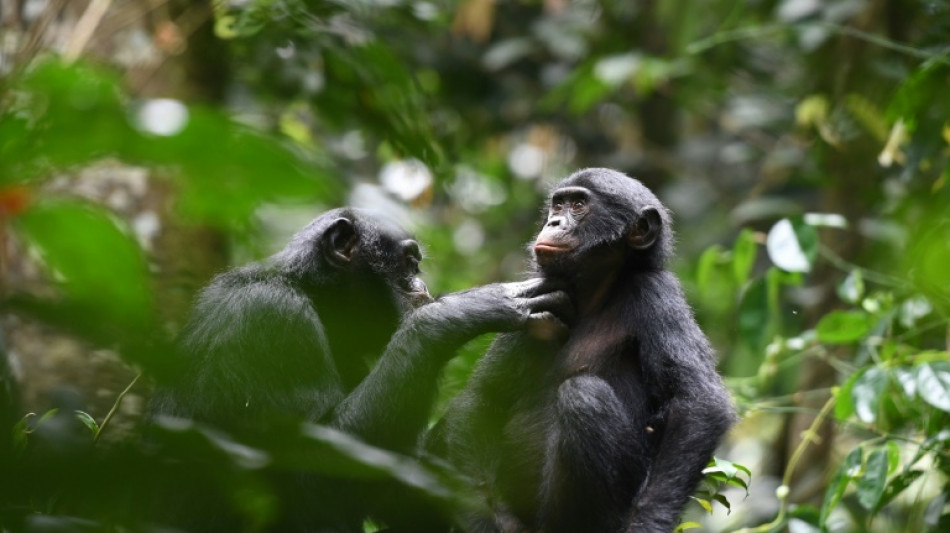
-
 Cambodia says Thailand bombs casino hub on border
Cambodia says Thailand bombs casino hub on border
-
Thai queen wins SEA Games gold in sailing

-
 England Ashes dreams on life-support as Australia rip through batting
England Ashes dreams on life-support as Australia rip through batting
-
Masterful Conway, Latham in 323 opening stand as West Indies wilt

-
 Danish 'ghetto' tenants hope for EU discrimination win
Danish 'ghetto' tenants hope for EU discrimination win
-
Cricket Australia boss slams technology as Snicko confusion continues

-
 Conway and Latham's 323-run opening stand batters hapless West Indies
Conway and Latham's 323-run opening stand batters hapless West Indies
-
Alleged Bondi shooters holed up in hotel for most of Philippines visit

-
 Japan govt sued over 'unconstitutional' climate inaction
Japan govt sued over 'unconstitutional' climate inaction
-
US approves $11 billion in arms sales to Taiwan: Taipei

-
 England battle to save Ashes as Australia rip through top-order
England battle to save Ashes as Australia rip through top-order
-
Guarded and formal: Pope Leo XIV sets different tone

-
 What to know about the EU-Mercosur deal
What to know about the EU-Mercosur deal
-
Trump vows economic boom, blames Biden in address to nation

-
 Conway 120 as New Zealand in command at 216-0 against West Indies
Conway 120 as New Zealand in command at 216-0 against West Indies
-
Taiwan eyes fresh diplomatic ties with Honduras

-
 ECB set to hold rates but debate swirls over future
ECB set to hold rates but debate swirls over future
-
Asian markets track Wall St lower as AI fears mount

-
 EU holds crunch summit on Russian asset plan for Ukraine
EU holds crunch summit on Russian asset plan for Ukraine
-
Australia PM vows to stamp out hatred as nation mourns youngest Bondi Beach victim

-
 Australian PM vows hate speech crackdown after Bondi Beach attack
Australian PM vows hate speech crackdown after Bondi Beach attack
-
Turkmenistan's battle against desert sand

-
 Ukraine's Zelensky in Poland for first meeting with nationalist president
Ukraine's Zelensky in Poland for first meeting with nationalist president
-
England in disarray at 59-3 in crunch Test as Lyon, Cummins pounce

-
 Japan faces lawsuit over 'unconstitutional' climate inaction
Japan faces lawsuit over 'unconstitutional' climate inaction
-
Migrants forced to leave Canada after policy change feel 'betrayed'

-
 What's next for Venezuela under the US oil blockade?
What's next for Venezuela under the US oil blockade?
-
Salvadorans freed with conditional sentence for Bukele protest

-
 Brazil Congress passes bill to cut Bolsonaro prison term
Brazil Congress passes bill to cut Bolsonaro prison term
-
Cricket Australia boss slams technology 'howler' in Ashes Test

-
 New Zealand 83-0 at lunch on day one of third West Indies Test
New Zealand 83-0 at lunch on day one of third West Indies Test
-
Ecuadorean footballer Mario Pineida shot and killed

-
 US government admits liability in deadly DC air collision
US government admits liability in deadly DC air collision
-
Hemogenyx Pharmaceuticals PLC - Issue of Equity

-
 SolePursuit Capital Syndicate Establishes Strategic Coordination Office and Appoints Laurence Kingsley as Head
SolePursuit Capital Syndicate Establishes Strategic Coordination Office and Appoints Laurence Kingsley as Head
-
1933 Industries Announces Maturity of Unsecured Convertible Debentures and Encourages Conversion to Support Continued Growth

-
 Ex-podcaster Dan Bongino stepping down as deputy FBI director
Ex-podcaster Dan Bongino stepping down as deputy FBI director
-
Real Madrid scrape past third-tier Talavera in Spanish Cup

-
 Hunt for US college mass shooter drags into fifth day
Hunt for US college mass shooter drags into fifth day
-
Cherki inspires Man City, Newcastle strike late to reach League Cup semis

-
 Barcelona, Lyon and Chelsea reach Women's Champions League quarters
Barcelona, Lyon and Chelsea reach Women's Champions League quarters
-
Venezuela reacts defiantly to US oil blockade, claims exports unaffected

-
 Nasdaq tumbles on renewed angst over AI building boom
Nasdaq tumbles on renewed angst over AI building boom
-
S.Africa expels Kenyans working on US Afrikaner 'refugee' applications

-
 US Congress ends Syria sanctions
US Congress ends Syria sanctions
-
Cherki inspires Man City cruise into League Cup semis

-
 Billionaire Trump nominee confirmed to lead NASA amid Moon race
Billionaire Trump nominee confirmed to lead NASA amid Moon race
-
Mahomes undergoes surgery, could return for 2026 opener: Chiefs

-
 Melania Trump steps into spotlight in Amazon film trailer
Melania Trump steps into spotlight in Amazon film trailer
-
Brazil Senate advances bill that could cut Bolsonaro jail term

| SCS | 0.12% | 16.14 | $ | |
| RBGPF | -2.23% | 80.22 | $ | |
| RELX | -0.64% | 40.56 | $ | |
| CMSC | -0.34% | 23.26 | $ | |
| NGG | 1.8% | 77.16 | $ | |
| RIO | 1.55% | 77.19 | $ | |
| GSK | -0.14% | 48.71 | $ | |
| BCE | -0.78% | 23.15 | $ | |
| BTI | -0.21% | 57.17 | $ | |
| CMSD | -0.43% | 23.28 | $ | |
| AZN | -1.66% | 89.86 | $ | |
| JRI | -0.6% | 13.43 | $ | |
| BCC | 0.59% | 76.29 | $ | |
| RYCEF | 1.48% | 14.86 | $ | |
| VOD | 0.86% | 12.81 | $ | |
| BP | 2.06% | 34.47 | $ |

Good neighbors: Bonobo study offers clues into early human alliances
Human society is founded on our ability to cooperate with others beyond our immediate family and social groups.
And according to a study published Thursday in the journal Science, we're not alone: bonobos team up with outsiders too, in everything from grooming to food sharing, even forming alliances against sexual aggressors.
Lead author Liran Samuni of the German Primate Center in Gottingen told AFP that studying the primates offered a "window into our past," possibly signaling an evolutionary basis for how our own species began wider-scale collaborative endeavors.
Bonobos (Pan paniscus) are our closest living relatives, alongside chimpanzees (Pan troglodytes), and the two species are also very closely related to each other.
But while encounters between chimpanzee groups are inherently hostile and often result in lethal violence, interactions between bonobo parties hadn't been as well examined.
That's because bonobos, an endangered species, are notoriously difficult to study in their natural habitat -- and they live only in remote regions of the Democratic Republic of the Congo.
With research on chimps dominating the literature, some scientists assumed hostility against outsiders was innate to human nature -- something we had perhaps trained ourselves to get past by inventing new social norms, even as that trait lurked deep inside.
- Female coalitions against sexual aggression -
In the new paper, Samuni teamed up with Martin Surbeck, a professor at Harvard who founded the Kokolopori Bonobo Reserve, to carry out a long-term study over two years.
"The first thing they do... is try to run away from you," Surbeck told AFP, explaining it took a long time for the bonobos to overcome their inherent fears of humans and behave normally.
Days began at 4:00 am and involved researchers trekking through the dark forest until they reached bonobo nests, then waiting for sunrise so they could follow the apes throughout the day, aided by indigenous Mongandu trackers.
Samuni and Surbeck focused on two small bonobo groups of 11 and 20 adults respectively, and found to their surprise they spent 20 percent of their total time together -- feeding, resting, traveling and more.
"Every individual is different," said Samuni. "There are those that are more introverts, extroverts, there are those that are more pro-social than others."
The team found that cooperation between the groups was driven largely by a select few who were more helpful within their own group. These individuals tended to connect with similar "pro-social" bonobos from the other group, creating a system of mutual benefit, or "reciprocal altruism."
The positive interactions occurred despite a low level of genetic relatedness between the groups, and despite the fact that reciprocity -- such as paying back a gift of fruit -- often took place much later, in future encounters.
Intriguingly, females, both within and from different groups, were found to form coalitions -- sometimes to chase an individual from a feeding tree, at other times to prevent a coercive sexual advance from a male.
"We don't see sexual coercion in bonobos, which is a common phenomenon in chimpanzees," said Surbeck. "One aspect of that might be due to those female coalitions, that help the females to maintain reproductive autonomy."
- Are we more like chimps or bonobos? -
The authors suggest their research offers an "alternative scenario" to the idea human cooperation is against our nature, or that we broadened cooperation with outsiders by first merging our extended families.
But "this does not mean that reconstructions of ancestral hominin species should be based only on bonobos," Joan Silk, a scientist at Arizona State University wrote in a related commentary.
There are other ways in which chimpanzees seem closer to humans than bonobos -- for example they more often hunt animal prey and use tools. Male chimpanzees also form strong bonds with fellow males and support them in aggressive acts, while bonobo males form stronger ties to females.
Understanding the natural selection forces that created these differences "may help to elucidate how and why humans became such an unusual ape," she concluded.
H.E.Young--AMWN


